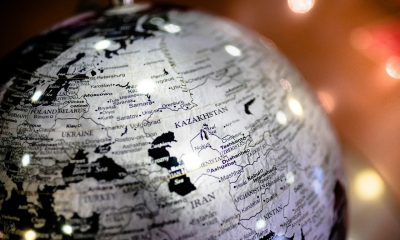FrontPage
#Catarul nu ar trebui să găzduiască #World Cup


Last week, the International Olympics Committee broke with tradition and announced the two latest cities to be chosen to host the Olympic Games simultaneously. Paris will host the event in 2024 and four years later, the flame will pass to Los Angeles. What is more surprising than the double announcement is that this particular process – while shaken by the fact that several would-be hosts withdrew their bids mid race – was not mired by corruption. Embezzlement, doping and corruption were all spectres at the feast in the 2014 Winter Games in Sochi Și 2016 Rio de Janeiro Olympics, while Japan, which will host the event in 2020, has been accused of making ‘suspicious payments’ to help secure its role as host.
The fact that this particular selection process has been mercifully free of corruption so far does not mean that the IOC can consign this unfortunate period in its operating life to history though. Fresh allegations continue to surface, most recently thesmoking gun from the Guardian, which reported allegations that Papa Massata Diack, the son of the disgraced former IOC member Lamine Diack, splashed out thousands of euro on jewellery using bribes from Rio 2016 and Tokyo 2020. However, the IOC at least appears determined to root out the corruption in its midst and has even hired none other than Former U.N. Secretary General Ban Ki-Moon as the new head of its ethics commission. It’s a step in the right direction, but it is going to be a while before the stench of corruption that lingers around international sports lifts.
While the IOC seems to be on the right track in rooting out corruption, one organization in particular has yet to mend its ways: FIFA. A recent book by renowned British journalist David Conn spares no punches in exposing the heavy legacy of graft that has led to “the fall of the house of FIFA”. Unlike its Olympic counterpart, the Zurich-based body remains unreformed two years after the scandal that brought down Sepp Blatter and de-frocked his cronies.
Blatter’s replacement, current FIFA president Gianni Infantino is also failing to live up to the task, and has faced accusations of intenționat stalling the organization’s reform process. But all is not lost: much like the IOC needed to deliver one clean selection process to be partially redeemed, maybe FIFA could follow in its steps – by re-running the competition that awarded Qatar, a state sponsor of terrorism with an abysmal human rights record, the 2022 World Cup.
Since the very beginning, Qatar and Blatter’s fates were intertwined: according to author David Yallop, the tiny state that helped Blatter win his 1998 election by thrusting envelopes stuffed with dollars into the hands of FIFA bigwigs to the tune of $1 million. While that practice seems to have been a constant of Doha’s interactions with the sports body, the 2022 World Cup bid process turned out to be by far FIFA’s biggest scandal.
Not just because Qatar is woefully ill-equipped to host an international sporting event, as it barely had any stadiums before winning the bid, but its scorching 50 degree heat is not quite the right environment for football players. But all these facts had little impact, once Doha’s mase de bani made their way into the deep pockets of corruptible FIFA officials.
While FIFA officials were happily spending Qatar’s money, thousands of people were enlisted by the emirate to achieve its dreams of hosting the tournament. Spending as much as $ 500 milioane pe săptămână to get the country in shape before 2022, Doha created one of the most complex systems of modern day slavery in the world – the kafala. At least 30,000 sclavi of mainly Indian, Nepalese, Filipinos and Bangladeshi origin were enlisted to build the stadiums, training grounds and hotels the emirate promised FIFA. These indentured ‘guest labourers’ receive low wages or no wages, live crammed into tiny rooms and work in deplorable conditions – prompting Amnesty International to call it the “Qatar World Cup of ShameMatei 22:21
Amnesty officials aren’t the only ones feeling aggrieved by FIFA’s decision to cosy up to a state sponsor of terrorism – Germany’s FA president Reinhard Grindel shot back at the organization earlier this year and said that “The football community worldwide should agree that … major tournaments should not be played in countries that actively support terror.” His comments were prompted by deteriorating relations between Qatar on one hand and Saudi Arabia, the United Arab Emirates and Bahrain on the other. The Gulf countries have halted diplomatic relations, closed land routes to Qatar and refused to allow use of their sea ports or airspace due to suspicions that Doha is a major funder of terrorist activities and that its Emir Tamin Bin Hamad is ‘cuddling up to Iran’, ‘allying himself with the outlawed ‘Muslim Brotherhood’ and spreading ‘hate and venom’ via al-Jazeera TV, which Qatar funds. President Trump too has called on Qatar to ‘stop the funding of terrorism’ and endorsed the collective cold shoulder it is receiving from its Gulf brethren.
Doha has been taking flak for its funding of terrorist groups in the Middle East - such as Hamas, Nusra and ISIS – since the early 2010s. Senior figures of Al Qaeda took milioane from Qatar-based donors, as has the organization’s Arabian Peninsula chapter, AQAP. In spite of repeated pledges from the ruling Al Thani family that the government is taking active steps to sever any ties between Qatar and such groups, precious little has been achieved. In 2014 the State Department confirmat that Doha’s “disruption of terrorist financing … remains inconsistent”, statements echoed the following year by a senior US official who reportedly a spus that “there continues to be concerns about terrorist financing going on in Qatar.”
But this doesn’t seem to worry FIFA too much. Not in the slightest, in fact. On June 19th, the body took the time to publish a press release and reassure the world that the stadiums Qatar is building are “advancing rapidly”, with not a word to spare for the laundry list of abuses Doha is accused of committing.
FIFA’s 2015 corruption scandal could have ushered in a brave new world for international sports. But until FIFA acknowledges its failings in the case of Qatar and re-runs the competition, that brave world will have to wait.
Trimiteți acest articol:
-

 Conflictezile în urmă 4
Conflictezile în urmă 4Kazahstanul intervine: eliminarea diviziunii dintre Armenia și Azerbaidjan
-

 Legea privind serviciile digitalezile în urmă 5
Legea privind serviciile digitalezile în urmă 5Comisia ia măsuri împotriva Meta din cauza posibilelor încălcări ale Legii privind serviciile digitale
-

 Extinderezile în urmă 4
Extinderezile în urmă 4UE își amintește de optimismul de acum 20 de ani, când 10 țări s-au alăturat
-

 Covid-19zile în urmă 4
Covid-19zile în urmă 4Protecție avansată împotriva agenților biologici: Succesul italian al ARES BBM - Bio Barrier Mask



























